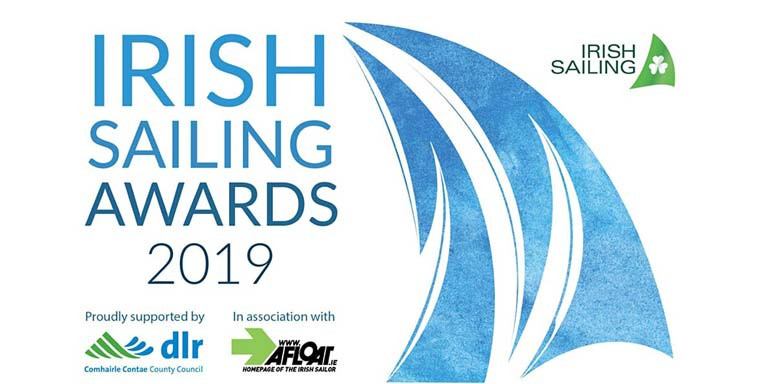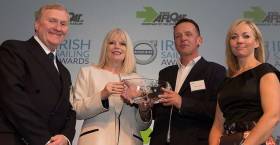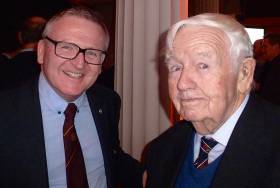Displaying items by tag: Sailor of the Year Awards
Irish Sailing Awards Go Online – Join Us on Saturday
Although we’re not getting together in person for the Irish Sailing Awards on Saturday night (21 March), we want to get together on screen instead and celebrate as we announce the winners.
We’re going to do this on Saturday evening, starting at 6.30 pm, when we announce all the winners on our Facebook page here. You can join the event here. So on Saturday night, tune into our Facebook page, like and share, so we can celebrate all our nominees and winners.
The winners will also be announced on Afloat.
The Awards are supported by Dun Laoghaire-Rathdown County Council and in association with Afloat
The Awards will be announced as follows:
- Irish Sailing Senior Instructor of the Year
- Irish Sailing Inclusion Award
- Irish Sailing Sustainability Award
- Irish Sailing Youth Sailor of the Year
- Irish Sailing Training Centre of the Year
- Irish Sailing/Afloat.ie Sailor of the Year
- Irish Sailing President’s Award
You can read about our nominees here
Tickets Available for Volvo Sailing Awards
Tickets are still available for the Volvo Irish Sailing Awards in a little over a week's time. Join Irish Sailing for an evening of fun and celebration at this year’s Volvo Irish Sailing Awards with categories for the young talent representing Ireland overseas, the training centres and instructors setting the standards in leadership and teaching, the battle for Sailor of the Year amongst a wide pool of nominees representing all fields of sailing, and two new awards which recognise people and organisations pushing innovations in the areas of Inclusion, and Sustainability.
The Volvo Irish Sailing Awards take place on Friday 8 February 2019 at the RDS Concert Hall, followed by a supper buffet. We do hope you can join us. Please register for your free tickets at [email protected]
Hotels: Irish Sailing has organised a reduced rate for the night of the Awards at the nearby Clayton Hotel, Ballsbridge. You can book directly with them using the promo code: SAILING. here
All Ireland Gets Together for Sailing Celebration (Photo Gallery of the Sailor of the Year Awards Here)
In public perception terms, sailing had never been higher on the scale of national interest in Ireland than it was in August 2016 when Annalise Murphy’s Olympic Silver Medal victory had an entire nation and its widespread diaspora on the edge of their seats as the final seconds were sailed out in the Medals Race at Rio writes W M Nixon.
But popular attention is a very fickle thing which has now turned to other matters. And with Annalise Murphy since being garlanded with well-earned major national awards under just about every category you could think of, there wasn’t undue concern that the biggest non-surprise for a long time – her elevation to become the Volvo Sailor of the Year 2016 – would simply be taken for granted, and as such, would be regarded as non-news by mainstream media.
So whether it was a mature acceptance of this reality by sailing’s organizers, or whether or not it was just pure serendipity, is neither here nor there. But the fact is that holding the awards ceremony on the last Friday night of January in Dublin may have been the sentence of death of terms of popular news coverage. But for the true faithful of the sailing community from every last corner of Ireland, it was the perfect opportunity for an extraordinarily diverse crowd of people to gather and celebrate their sport in all its forms, and hail their heroes.
Of course the ultimate spotlights were on our supreme award winner Annalise Murphy, and the Youth Sailor of the Year Ewan MacMahon. But with other youth awards, training centre awards, and the very elastically-interpreted Afloat.ie “Sailor of the Month” awards with 27 winners coming into focus, that same spotlight shone brightly if briefly on remarkable achievements in every part of Ireland and abroad, all of them contributing to the fabulous tapestry which is Ireland’s world of boats.
Normally the world of boats and sailing is well aware that it is a minority sport. But on Friday night, it wasn’t a case of it briefly becoming a majority sport. It was the only sport. The camaraderie was palpable. The shared enthusiasm was energising. And the way that people from near and far instantly connected was heartening to behold.
For me, it was summed up by one brief but eloquent encounter. I was talking with Ted Crosbie, who was Admiral of the Royal Cork in 1984-86, and long before that he was the All Ireland Helmsmans Champion, racing in IDRA 14s in 1950. He was there to see his grand-daughter Sophie receive proper recognition for her achievements in Topper racing. As we chatted, Peter Ryan of the National YC hove into view with his shipmate Stephen Tudor of Pwllheli in North Wales, whose overall victory in the ISORA Championship 2016 with his J/109 made him Afloat.ie “Sailor of the Month” for September.
The fact that a top Welsh skipper should win an Irish Sailor of the Month award says all that needs to be said about the creative flexibility of the Afloat system. But equally, here were two top sailors from very different places and backgrounds and generations instantly hitting it off in their shared joy in our sport. The divine spark was undoubtedly present. It was that kind of night.































































